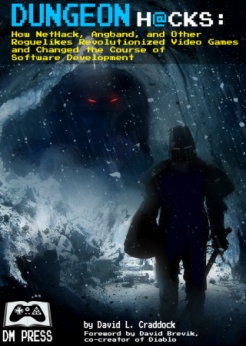
Video Game Book Reviews
Note: The review is based on the late draft of the book provided by the author. There might be minor differences between the reviewed version and the published one.
The term "roguelike" can mean different things to different people as the modern indie scene has taken a liking to the genre's most recognizable features: procedural generation and permanent death. Still, the difference between traditional roguelikes - complex turn-based dungeon crawlers, usually with ASCII graphics - and the modern roguelike-lite genre is quite obvious to anyone who played both NetHack and Spelunky. While games from the former category can be very difficult and unwelcoming to the newer players, they're also some of the most creative and fascinating titles out there - they require a lot of effort but they're also extremely rewarding when you learn how to play them.
For those who always found the genre inaccessible, David Craddock's book might be a turning point as it shows the history of the genre's most important games by describing the lives of their creators. Dungeon Hacks is - as it says in the foreword - primarily a book about people: the early gamers who wanted to create their own games, the high school and university students experimenting with new technologies, hackers and programmers who figured out new ways of doing things with old computers and applied them to create new forms of entertainment. Dungeon Hacks talks about computer culture from before the 'eternal September' and near-universal access to this kind of technology: ARPANET, university mainframes, Usenet newsgroups. The book shows how the roguelike genre was shaped by the influence of 1980s geek culture (from Dungeons & Dragons to Colossal Cave Adventure), the limitations of old computers and pure passion.
That's not to say that Dungeon Hacks offers nothing to those who already know about the history of roguelikes. As a lot of the material for the book is based on the author's interviews with the developers, it contains information not available in other sources. It's a very detailed resource - but it never gets boring as it's written almost like a collection of short stories (the author's background as a fiction writer is apparent in his writing style) describing the interconnected lives of characters (developers). It manages to do so without dumbing down or sensationalizing history.
The games themselves are a surprisingly minor part of Dungeon Hacks - while the author describes the basics and the interviewees sometimes mention interesting gameplay elements, the book's focus is more on how and why they were created than on how and why they're played. That's not necessarily the book's fault, just a difference in focus - although it's worth mentioning that Dungeon Hacks is a history book, not a piece of game criticism or analysis. The roguelikes described in the book are the historically important ones and their importance - pioneering new mechanics, popularizing the genre, influencing other games - is the lens through which they're viewed. You won't find reviews or walkthorughs in Dungeon Hacks - it's simply not about that. Still, the chapter about Angband seems to go too far in the biographical direction as despite the title ('the many flavors of Angband') it barely touches upon the game's main draw - the multitude of variants - and sometimes feels like a long list of people who worked on the game.
The book ends with a large amount of additional content: interviews, pictures, "sidequests" (basically digressions cut from the chapters proper), fragments of the author's upcoming book about 7 Day Roguelike Challenge and endnotes. It's pretty cool stuff, but the choice to put notes and digressions at the end and having the readers click/tap back and forth on the hyperlink is a bit questionable. It's just less convenient than a simple footnote at the bottom of the page and it would be better if the published version put them there.
All in all, Dungeon Hacks is a good history book about one of the most hardcore video game genres. While it isn't a comprehensive look at the whole genre and it doesn't exhaust everything there is to say about the game it describes, it does a good job introducing the key concepts of roguelike genre and an even better job talking about people who made the genre happen. As such, it's an important look at the more "underground" side of gaming culture: as traditional rogeulikes were too niche to turn their creators into celebrities but creative enough for them to influence the evolution of gaming (from both technical and artistic standpoints), projects like Dungeon Hacks are necessary to keep important but not immediately recognizable parts of gaming history from being forgotten.
